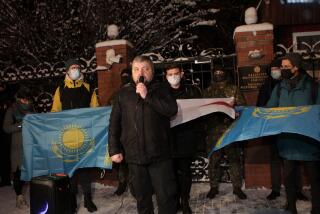Chechen President Sworn In Amid Russian Grumbling
- Share via
MOSCOW — A new president for postwar Chechnya was sworn in Wednesday, in a ceremony that marked a formal end to two years of war with Russia’s armies in the separatist southern republic but that a grumpy Moscow still treated with scant grace.
In the Chechen capital of Grozny, Aslan Maskhadov, a moderate whom Russia has grudgingly accepted as the least objectionable of the military leaders who defeated Moscow’s troops, swore his presidential oath on the Koran. He pledged to realize the dream of independence for which his ancestors and contemporaries have always fought.
“Now it is the duty of each and every one of us to realize the expectations of our ancestors, our heroes fallen in holy war, of the right to live freely and independently,” he said in his inaugural speech. “For hundreds of years, our people were not allowed to live freely, to be masters of their country . . . killed when they [Russians] wanted to kill, burned when they felt like it, labeled ‘bandits’ when they felt like it, deported when they felt like it.”
As part of the festivities outside the Chemists’ Palace of Culture, the only big building in the Grozny area intact enough after the war to hold the throngs of religious and political leaders, hundreds of bearded former fighters in fatigues fired guns triumphantly in the air.
After fighting against Russian rule for a generation in the 19th century, Chechens were among the Muslim mountain tribes forced into the czars’ empire as it expanded south. In 1944, the entire people were deported to the Soviet interior and kept in exile for 13 years.
Russians and Chechens came to blows again in December 1994, when Moscow sent in troops to crush the independent state that the separatists unilaterally declared three years earlier. But the rebels fought on from the hills and seized back Grozny in August, forcing peace talks and a negotiated settlement that still visibly sticks in Russians’ throats.
Russia now hopes Maskhadov will continue his peace talks and that Chechnya will remain placid enough for vast oil deposits from neighboring Azerbaijan to be routed to markets in the West through Chechnya and Russia--rather than through rival pipelines in other countries. This would earn Moscow substantial transit fees once the first oil starts flowing next autumn.
But fundamental political misunderstandings still cloud the future. Chechens say they have already won their independence and believe the peace deal with Moscow gives them a five-year breathing space in which to negotiate their future relationship. Russia believes the five-year pause is just meant to give Moscow time to decide whether to allow Chechnya full independence.
Although Moscow’s envoy to Chechnya, Security Council boss Ivan P. Rybkin, attended Wednesday’s inaugural, Russian warnings to other countries that they face losing diplomatic ties with Moscow if they begin talking to the Chechens helped keep the number of foreign dignitaries down; Moscow, for example, declined to issue visas to a Lithuanian parliamentary delegation.
Meantime, “Vremya,” Russia’s prime-time news broadcast, made it clear to Russians that the Chechen president’s inauguration was a matter of no import to them, broadcasting a report of it in the 21st minute of the program, after describing every parliamentary committee meeting and regional hiccup in Russia.
Russian news agencies also glossed over Maskhadov’s passionate defense of Chechen independence but played up a later promise in his speech to fight postwar crime in the ruined region, still awash with guns five months after the war ended.
On Wednesday, one inaugural guest who was unabashed by Moscow’s snubbing of the Chechens was Alexander I. Lebed, who as Rybkin’s predecessor at the Security Council negotiated the Aug. 31 peace deal with Maskhadov.
Lebed, who was sacked soon afterward, has been publicly at odds with Russian President Boris N. Yeltsin ever since, never missing a chance to rile his country’s ailing leader. After an official lunch in Grozny, Lebed told reporters that Yeltsin was incapable of controlling the situation in Chechnya and should now be put on a pension so there could be a younger, more capable president--like Lebed himself. “I can settle things with anyone,” he said.
More to Read
Sign up for Essential California
The most important California stories and recommendations in your inbox every morning.
You may occasionally receive promotional content from the Los Angeles Times.










